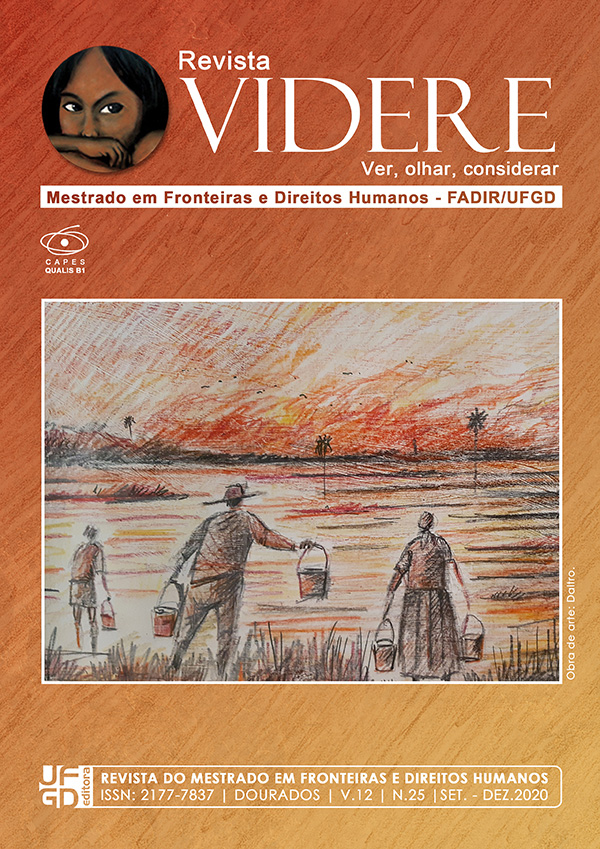Mulheres & fronteira: a invisibilidade dos trabalhos das professoras em áreas fronteiriças
DOI:
https://doi.org/10.30612/videre.v12i25.11713Palavras-chave:
Fronteira. Divisão Sexual do Trabalho. Professora. Gênero.Resumo
O presente artigo traz contribuições da pesquisa “O(s) trabalho(s) das mulheres professoras da fronteira Brasil-Bolívia” desenvolvida no Programa de Pós-Graduação em Psicologia da Universidade Federal da Grande Dourados (UFGD). A partir de um mapeamento realizado no Portal Regional da Biblioteca Virtual em Saúde (BVS), esta pesquisa está fundamentada na Psicologia Social em diálogo com a Epistemologia Feminista e os Estudos de Trabalho da Mulher em uma perspectiva de gênero. Constatamos a ausência de publicações de pesquisas desenvolvidas em áreas de fronteira e a falta de análise da perspectiva de gênero sobre o trabalho docente, especificamente sobre o trabalho das mulheres professoras em áreas de fronteira. Nossa análise teve como propósito compreender os múltiplos olhares e sentidos sobre as fronteiras culturais, de idiomas e de historicidades, bem como sobre a divisão sexual do trabalho e sua influência na vida pública e privada dessas mulheres professoras que vivem e trabalham nas fronteiras.Downloads
Referências
BIBLIOTECA VIRTUAL EM SAÚDE. Descritores em Ciências da Saúde (DECS). (2015). Disponível em: http://decs.bvs.br/P/decsweb2015. Acesso em: 01 jul. 2018.
COSTA, G. V. L. (2015). Os bolivianos em Corumbá-MS: conflitos e relações de poder na fronteira. Mana, Rio de Janeiro. v. 21, n. 1, p. 35-63. Disponível em: http://www.scielo.br/scielo.php?script=sci_arttext&pid=S010493132015000100035&lng=en&nrm=iso. Acesso em: 13 maio. 2019.
HIRATA, H., & KERGOAT, D. (2007). Novas configurações da divisão sexual do trabalho. Cadernos de Pesquisa, v. 37, n. 132, set/dez. Disponível em http://www.scielo.br/pdf/cp/v37n132/a0537132.pdf Acesso em: 25 maio. 2018.
IBGE, Instituto Brasileiro de Geografia e Estatística. (2019). População estimada. IBGE, Diretoria de Pesquisas, Coordenação de População e Indicadores Sociais, Estimativas da população residente com data de referência 1º de julho. Disponível em: https://cidades.ibge.gov.br/brasil/ms/corumba/panorama. Acesso em: 05 set. 2019.
LEITE, E. F., & BULLER, L. (2015). Fronteira e fronteiriços (as). In: COLLING, A. M., & TEDESCHI, L. A. Dicionário crítico de gênero. Dourados, MS: Ed. UFGD. pp. 289-296.
KERGOAT, D. (2009). Divisão sexual do trabalho e relações sociais de sexo. In: HIRATA, H. et al (org.). Dicionário Crítico do Feminismo. Editora UNESP: São Paulo, p. 67–75.
MARTINS, J. de S. (2018). Fronteira: a degradação do Outro nos confins do humano. 2ª ed. São Paulo: Contexto.
NUNES, J. A. (2002), "Teoria crítica, cultura e ciência: o (s) espaço (s) e o (s) conhecimento (s) da globalização". In: Santos, B. de S. (org.). A globalização e as ciências sociais. 2. ed. São Paulo, Cortez, pp. 301-344.
SCOTT, J. W. (1988). Gender and the Politics of History. New York: Columbia University Press. PP. 28-50.
SPINK, M. J. (2010). Linguagem e produção de sentidos no cotidiano [online]. Rio de Janeiro: Centro Edelstein de Pesquisas Sociais. 72 p. ISBN: 978-85-7982-046-5. Available from SciELO Books. Disponível em: https://static.scielo.org/scielobooks/w9q43/pdf/spink-9788579820465.pdf. Acesso em: 01/05/2018.
Downloads
Publicado
Como Citar
Edição
Seção
Licença
Os autores devem aceitar as normas de publicação ao submeterem a revista, bem como, concordam com os seguintes termos:
(a) O Conselho Editorial se reserva ao direito de efetuar, nos originais, alterações da Língua portuguesa para se manter o padrão culto da língua, respeitando, porém, o estilo dos autores.
(b) Autores mantém os direitos autorais e concedem à revista o direito de primeira publicação, com o trabalho simultaneamente licenciado sob a Atribuição-NãoComercial-CompartilhaIgual 3.0 Brasil (CC BY-NC-SA 3.0 BR) que permite: Compartilhar — copiar e redistribuir o material em qualquer suporte ou formato e Adaptar — remixar, transformar, e criar a partir do material. A CC BY-NC-SA 3.0 BR considera os termos seguintes:
- Atribuição — Você deve dar o crédito apropriado, prover um link para a licença e indicar se mudanças foram feitas. Você deve fazê-lo em qualquer circunstância razoável, mas de nenhuma maneira que sugira que o licenciante apoia você ou o seu uso.
- NãoComercial — Você não pode usar o material para fins comerciais.
- CompartilhaIgual — Se você remixar, transformar, ou criar a partir do material, tem de distribuir as suas contribuições sob a mesma licença que o original.
- Sem restrições adicionais — Você não pode aplicar termos jurídicos ou medidas de caráter tecnológico que restrinjam legalmente outros de fazerem algo que a licença permita.



















